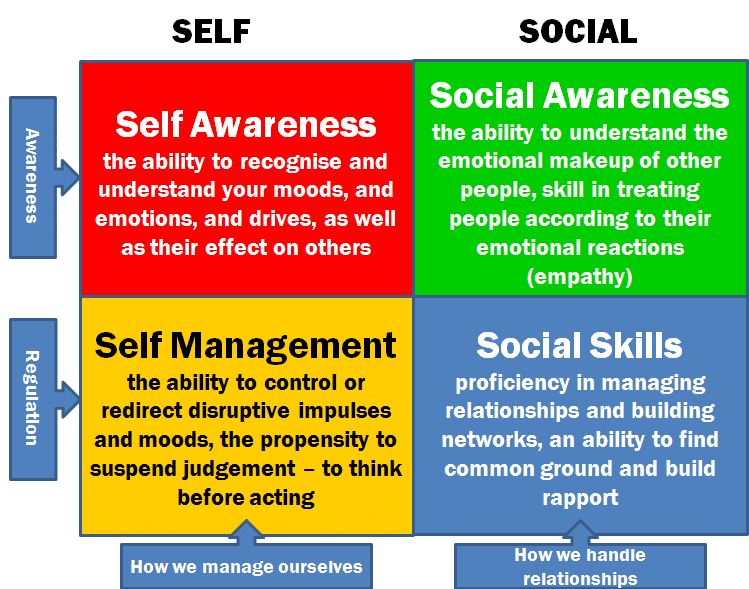Have you noticed that the most successful people are not necessarily the smartest or highly-skilled ones? Definitely, the explanation for this can be emotional intelligence. So, let’s dive deep into it and find out its specificities.
What is EQ?
EQ stands for Emotional Quotient, which is the level of people’s emotional intelligence. It defines as a person’s ability to identify and control his/her own emotions, as well as understand that of others and manage interactions.
To better understand emotional intelligence as a whole, let’s have a look at its model.

These 4 main components of emotional intelligence make it even more important than IQ.
So, what is the difference between EQ and IQ?
EQ and IQ
IQ defines people’s cognitive capacity for thinking and reasoning, which can assure high performance in studies and particular tasks. Adversely, EQ is the foundation for the main skills of success. The EQ has a great impact on communication skills, presentation skills, negotiation skills, time management, change tolerance, decision making, and so on.
So, let’s think of IQ and EQ as an Iceberg. The tip of the iceberg is the IQ: it can be easily estimated by standardized tests. EQ is the enormous body of the iceberg and is responsible for most part of the success.
According to TalentSmart’s study, emotional intelligence is reasonable for 58% of job performance and people with high EQ make $29000 more annually than their low EQ counter-parties.

How Does EQ Contribute to Success?
Self-Development and Control
People with higher self-awareness tend to admit their weaknesses and make efforts to work towards self-improvement. Furthermore, they recognize their possibilities and refrain from things they can’t handle, thus avoiding unpleasant situations and problems.
Mental Well-Being
Emotional intelligence contributes to a positive attitude and lightens anxiety and depression. Correspondingly, a high level of EQ correlates to overall well-being and a happier outlook on life, which is one of the core keys to success.
Related: The Power of Positive Attitude on Workplace Productivity
Conflict Resolution and Negotiations
People with higher emotional intelligence tend to understand people’s emotions and are empathetic towards others. Furthermore, they have mature self-control. Thus, it is much easier for them to resolve conflicts or avoid them at all.
The sense of listening and understanding, on the other hand, helps people with high EQ to better negotiate. This way they can achieve conflict resolution which will help them control their feelings and behavior.
Anyone can get angry – that’s easy. But to get angry in the right way, for the right reason, at the right time, and with the right person -that’s not so easy.
Aristotle
Relationship Management and Leadership
Emotionally savvy and intelligent people have the ability to understand others’ emotions and feelings. They practice strong empathy and can motivate and inspire people. Thus, people with high EQ are successful in building strong bonds and develop extensive networks with colleagues, acquaintances and friends.
Despite the fact that some people naturally have higher emotional intelligence, the good news is that EQ can also be learned and developed. The connection between your emotional and rational “parts of the brain” is your emotional intelligence. You can improve it by repeatedly using EQ development strategies so that emotionally intelligent behaviors become a habit.
Also: 5 Simple Yet Effective Tips To Build a New Habit!

